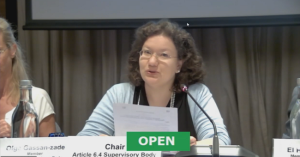In a step aimed at bolstering global climate efforts, a United Nations Body has reached consensus on key regulatory documents to operationalise a new UN carbon crediting mechanism, designed to facilitate international collaboration in reducing emissions and combatting climate change.

The Supervisory Body is responsible for overseeing the vital carbon crediting mechanism outlined in Article 6.4 of the Paris Agreement. In their final meeting before COP28, their focus was fixed on finalising the regulations that will underpin the Article 6.4 mechanism.
Key regulatory documents greenlighted for implementation
One of the key achievements of the meeting was the agreement reached by the Supervisory Body on essential regulatory documents, after they received substantial input from stakeholders in the previous month. The documents adopted include:
- An activity cycle procedure for projects
- An activity standard for projects
- A validation and verification standard for projects
- An accreditation standardand procedure
Safeguards for social and environmental rights developed
Another important area of discussion focused on creating robust regulations to ensure further safeguards for stakeholders are in place under the Article 6.4 mechanism. These regulations aim to protect rights, boost climate action, and provide a procedure for addressing potential concerns. The initiatives discussed include:
- An Appeals and Grievances Procedure, the first procedure of its kind under a UN carbon crediting mechanism. As part of their discussion on this topic, the Supervisory Body considered the importance of expanding the coverage of stakeholders eligible to file appeals or grievances.
- A Sustainable Development Tool, designed to assess and report on the application of robust social and environmental safeguards for projects under the Article 6.4 mechanism.
Both the Appeals and Grievances Procedure and the Sustainable Development Tool will undergo extensive public consultation to gather input from a wide range of stakeholders.
Progress on carbon emissions removal and methodology guidelines recommendations
At this meeting, two important areas of focus emerged: one centered on activities involving carbon emissions removal, while the other delved into the practical methods for the development of methodologies. The guidance for both emissions removal and methodology guidelines plays a crucial role in ensuring the effective operation of the Article 6.4 mechanism.
To finalise their recommendations to the CMA ahead of COP28, the Supervisory Body decided to hold an additional virtual meeting.
Plans for gender and regional representation bolstered
The Supervisory Body committed to bolstering gender representation in its work, aligning with existing UNFCCC Gender Action Plans.
The Body also agreed on the need to improve both the gender balance and regional representation of expert groups. A call for experts will be launched ahead of COP28 to improve gender balance and regional representation from Africa.
Commenting on the meeting, Olga Gassan-zade, the Chair of the Article 6.4 Supervisory Body, said: “Over the past five meetings, we adopted more than 100 crucial decisions to operationalise the mechanism, including over 20 decisions at this meeting. We’ve made tremendous progress, and it has been a collective labour of love. We’ve extended our discussions to ensure robustness of the frameworks we are to deliver to the CMA. We feel an enormous sense of responsibility to get this right and make this mechanism the benchmark setter we all hope it will be.
“We also want to actively address gender balance and regional representatives in our work. We will therefore be launching additional calls for experts to ensure we enhance gender and regional representation and thus deliver an inclusive, high-integrity mechanism.”
Mbaye Diagne, the Vice Chair of the Article 6.4 Supervisory Body, said: “After four days of intense deliberations in Bonn, we have concluded on an ambitious regulatory framework, agreeing on the essential pillars of the mechanism.
“The Rules and Procedures guiding our work set the bar high for a robust mechanism – we took on the challenge of operationalising it and are working hard to make it happen.”
